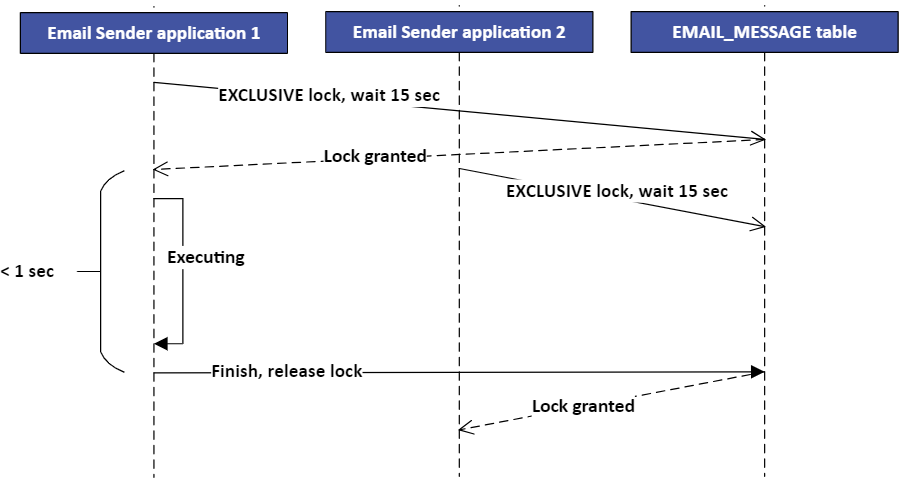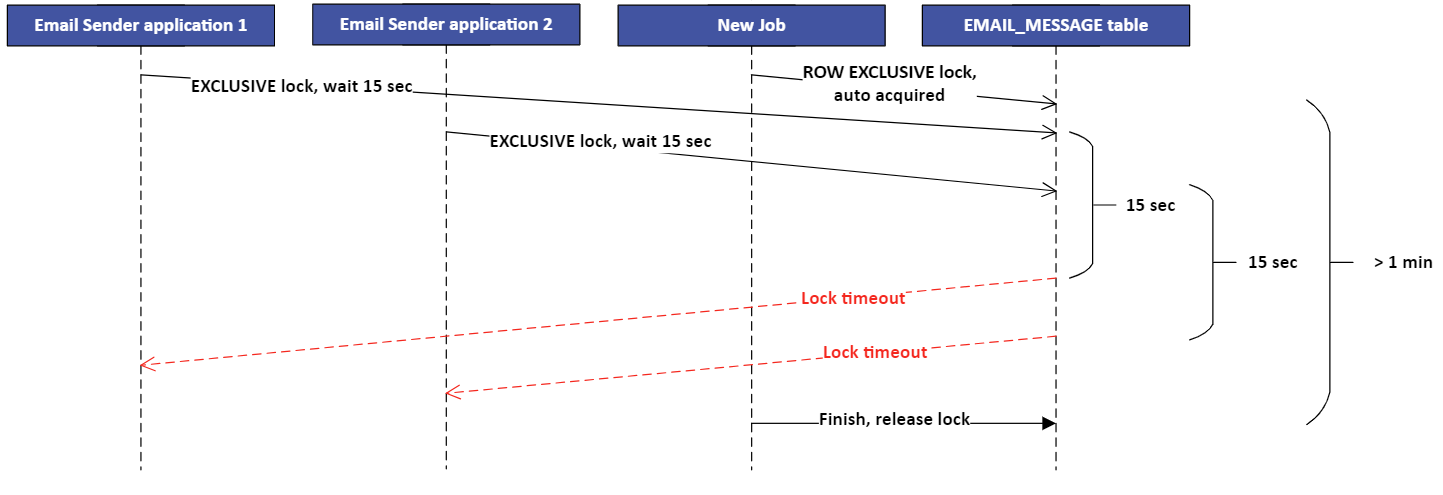TL;DR
We have a postgres stored procedure running as a job, which calls another stored procedure, which calls yet another stored procedure, and this internal stored procedure acquires ROW EXCLUSIVE lock on a table. This whole thing runs for over a minute, and the lock is kept until the end. This blocks another application from acquiring an EXCLUSIVE lock on the same table.
Full story
We have PostgreSQL 16.2 installed on RedHat 8.9. We have two separate databases on it, each database has multiple schemas and users with appropriate rights.
We have a locking problem between two schemas. One of the schemas has a table called EMAIL_MESSAGE, which stores emails to be sent. We have two instances of a mass email sender application, which first try to assign a specific amount of emails to themselves as step 1, and in step 2 they read the assigned email data and process them. In order for the two email sender applications to not overwrite each other's assigned emails, the assignment starts by locking the table. It is handled in a stored procedure like so:
1. Stored procedure starts with a BEGIN, so it starts a transaction
2. Verify some input parameters, exit in case of error
3. Another BEGIN, starting a subtransaction
4. Get EXCLUSIVE lock on the EMAIL_MESSAGE table, waiting for 15 seconds
5. If unsuccessful, we get 55P03 error, which is caught in the EXCEPTION block of the subtransaction
6. If successful, UPDATE a number of records with the instance id of the email sender application (stored procedure input parameter), then end the subtransaction, and end the procedure as well
Then, the email senders will SELECT all data with their instance id, which was previously assigned to them.
Some excerpts from the procedure:
 This is the incorrect behaviour, where this new job stored procedure is blocking the application with the automatic ROW EXCLUSIVE lock for over a minute:
This is the incorrect behaviour, where this new job stored procedure is blocking the application with the automatic ROW EXCLUSIVE lock for over a minute:
 I tried to put the part of this new stored procudedure which acquires the ROW EXCLUSIVE lock into its own transaction by putting a BEGIN END around it, it doesn't help. I tried to put a COMMIT to various places, into the subtransaction, and after the subtransaction, it is not allowed with "invalid transaction termination" error.
I admit that PostgreSQL transaction handling is a bit mysterious to me, I was more used to Oracle (pragma autonomous_transaction...), but trying to learn. As far as I understand, when I enter into a BEGIN EXCEPTION END block, it is a subtransaction automatically, commited when it exits, and rolled back in the EXCEPTION block. Doesn't it mean that when it exits from the block inside the
I tried to put the part of this new stored procudedure which acquires the ROW EXCLUSIVE lock into its own transaction by putting a BEGIN END around it, it doesn't help. I tried to put a COMMIT to various places, into the subtransaction, and after the subtransaction, it is not allowed with "invalid transaction termination" error.
I admit that PostgreSQL transaction handling is a bit mysterious to me, I was more used to Oracle (pragma autonomous_transaction...), but trying to learn. As far as I understand, when I enter into a BEGIN EXCEPTION END block, it is a subtransaction automatically, commited when it exits, and rolled back in the EXCEPTION block. Doesn't it mean that when it exits from the block inside the
CREATE OR REPLACE PROCEDURE assign_emails(
IN pi_instance TEXT,
... other params)
LANGUAGE 'plpgsql'
AS $BODY$
BEGIN
-- verify params, exit if wrong params
BEGIN
SET LOCAL lock_timeout = '15s';
LOCK TABLE email_message IN EXCLUSIVE MODE;
-- further processing after lock is acquired
UPDATE email_message SET processing_instance = pi_instance WHERE ...;
EXCEPTION
IF SQLSTATE = '55P03' THEN
-- logging lock error into a log table
ELSE
-- logging generic error into a log table
END IF;
END;
COMMIT; -- not sure if needed here? doesn't seem to do anything, but no error also
EXCEPTION
-- logging error into a log table
END;
$BODY$;CREATE OR REPLACE PROCEDURE process_minutely()
LANGUAGE 'plpgsql'
SECURITY DEFINER
AS $BODY$
DECLARE
v_cur CURSOR FOR SELECT ...;
v_rec RECORD;
BEGIN
-- loop through the appropriate records
OPEN v_cur;
LOOP
FETCH v_cur INTO v_rec;
EXIT WHEN NOT FOUND;
-- process v_rec, very complex processing logic here depending on status, time difference, related table records, etc.
SELECT col INTO var FROM email_message; -- this will acquire ACCESS SHARE lock
CALL register_email(params...); -- we call the email sending here
END LOOP;
CLOSE v_cur;
EXCEPTION
-- logging error into a log table
END;
$BODY$;CREATE OR REPLACE PROCEDURE register_email(params...)
LANGUAGE 'plpgsql'
SECURITY DEFINER
AS $BODY$
BEGIN
-- preprocessing, parameter checks
BEGIN
-- these procedures will internally acquire the ROW EXCLUSIVE lock by INSERT-ing and UPDATE-ing the email_message table
CALL original_create_email(params...);
CALL original_prepare_email(params...);
-- COMMIT; -- tried putting commit here, results in error
EXCEPTION
-- logging error into a log table
END;
-- COMMIT; -- tried putting commit here, results in error
EXCEPTION
-- logging error into a log table
END;
$BODY$; This is the incorrect behaviour, where this new job stored procedure is blocking the application with the automatic ROW EXCLUSIVE lock for over a minute:
This is the incorrect behaviour, where this new job stored procedure is blocking the application with the automatic ROW EXCLUSIVE lock for over a minute:
 I tried to put the part of this new stored procudedure which acquires the ROW EXCLUSIVE lock into its own transaction by putting a BEGIN END around it, it doesn't help. I tried to put a COMMIT to various places, into the subtransaction, and after the subtransaction, it is not allowed with "invalid transaction termination" error.
I admit that PostgreSQL transaction handling is a bit mysterious to me, I was more used to Oracle (pragma autonomous_transaction...), but trying to learn. As far as I understand, when I enter into a BEGIN EXCEPTION END block, it is a subtransaction automatically, commited when it exits, and rolled back in the EXCEPTION block. Doesn't it mean that when it exits from the block inside the
I tried to put the part of this new stored procudedure which acquires the ROW EXCLUSIVE lock into its own transaction by putting a BEGIN END around it, it doesn't help. I tried to put a COMMIT to various places, into the subtransaction, and after the subtransaction, it is not allowed with "invalid transaction termination" error.
I admit that PostgreSQL transaction handling is a bit mysterious to me, I was more used to Oracle (pragma autonomous_transaction...), but trying to learn. As far as I understand, when I enter into a BEGIN EXCEPTION END block, it is a subtransaction automatically, commited when it exits, and rolled back in the EXCEPTION block. Doesn't it mean that when it exits from the block inside the
Asked by Gábor Major
(163 rep)
Sep 11, 2024, 04:23 PM
Last activity: Sep 20, 2024, 07:05 AM
Last activity: Sep 20, 2024, 07:05 AM